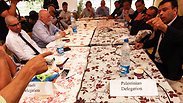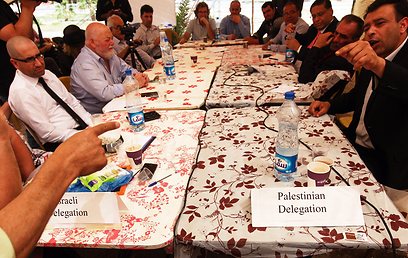
People to People Diplomacy: Israelis and Palestinians sit down to try to make peace
'The missing component in almost every peace making initiative is the involvement of the people,' says organizer of conference.
As a hot desert wind blew through a Bedouin-style tent near the West Bank town of Jericho, some 20 Israelis and Palestinians sat down to try to make peace. Among them were ex-generals, educators and even a few students, they say they hope to put pressure on their leaders to move toward a peace agreement.
“The missing component in almost every peace making initiative is the involvement of the people. Without the people it won’t work,” Dr. Sapir Handelman, one of the conference organizers told The Media Line. “The mission of Minds of Peace is to create a major Israeli –Palestinian public negotiating congress with political power. The purpose is to involve the people in the process and to press the leadership to reach agreements.”
He said his organization, Minds of Peace, has sponsored some 25 similar meetings as this one, each time coming up with a document calling for a “two-state solution” meaning an independent Palestinian state next to Israel based more or less on the 1967 borders. Each group comes up with a different document.
This conference got off to a somewhat rocky start with an argument between one of the Israeli participants and one of the Palestinian delegates, both former senior security officers and both yelling in fluent Arabic, over how the state of Israel was created. The other Israeli delegates kept interrupting, asking for a translation into Hebrew.
“It was built with the sweat and blood of my father and my grandfather,” Amos Avidov, the Israeli insisted.
“Not true,” retorted Palestinian Issa Abu Ram, a former general in the Palestinian security services. “If the British and the rest of the world didn’t help you, you wouldn’t have had a state.”
Organizer Handelman tried to calm the men, urging both “not to focus on past history but to try to move forward.”
Avidov, who would not give details about his security past, said he was not surprised by the Palestinian reaction.
“I speak Arabic so I know they see it differently from us,” he told The Media Line. “But I was injured in fighting (in Lebanon) and many members of my family were killed here, and so I see it differently.”
Avidov says he was attracted to Minds of Peace, which sponsors the meetings after becoming convinced that there is no military solution to the Israeli-Palestinian conflict.
“For many years I tried the other solution - to keep Israel secure and to do everything for that purpose,” he said. “In the last years I understood we have to look for another way.”
Palestinian former general Issa Abu Ram seemed more focused on the traditional Palestinian narrative that blames the "Israeli occupation."
“We think the Israeli government doesn’t want peace, and that Jewish settlements in the West Bank is the biggest obstacle,” Abu Ram told The Media Line. “But we hope that the Israeli public wants peace. Right now there is no trust between the people.”
One of the most colorful delegates was Col. (Ret) Ze’ev Raz, the leader of Israel’s bombing raid on the Osirak nuclear reactor in Iraq in 1981. He currently works for ELTA, a subsidiary of Israel Aircraft Industries.
“We learned from Ireland and South Africa that negotiations must be not only on the political level but on the personal level,” he told The Media Line. “So we meet Palestinians and we talk about all of the issues, including borders, Jerusalem and refugees.”
He said he is not optimistic that a solution to the conflict will come soon. Yet he said there is a precedent.
“If you had asked many Israelis a few days before (slain Egyptian President) Anwar Sadat arrived in Israel in 1977 they would have told you about how important the Sinai Peninsula is to Israel’s security,” he told The Media Line. “After Sadat spoke in the Knesset, many people saw it differently. I think that if a breakthrough is achieved, people will change their minds in a matter of seconds.”
Article written by Linda Gradstein.
Reprinted with permission from The Media Line.











